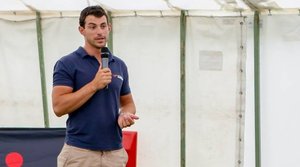How athletes should build up, not just back
Too many people strive without addressing the basics and miss the greater opportunities. Equally, some people never dream big enough. Both realities hinder performance and progression, but both can be fixed with genuine self-awareness and feedback. Read on to see what you can learn.
Every single method of planning for sports and other areas asks individuals to start with a goal or a dream. The problem that we see often with athletes is that they then focus only on a dream at this goal, and they don’t end up able to see the stepping stones to get there. Alternatively, they miss the points that must be completed before hitting that goal.
For example, you may aim to win a big race or qualify for an age group team. This automatically aligns you with all those other athletes who are doing the same sort of things. It may mean you are blind to areas you could be working on. Alternatively, your goal is based on your belief of how far you can reach in your current state. Therefore, your goal may be beneath what you can do if you start unlocking your ability by first working on some of the basic points.
Coaches are guilty of this as well. With many athletes, coaches can base what an athlete has done as their starting point for what they could do without genuinely understanding the athlete. This means they create a false sense of security about to go without necessarily looking at all the basics that need to be completed first, or the athlete may be only just holding everything together. Their most recent achievements are by far the best they can manage.
Thinking of this in terms of driving a car can sometimes be helpful. The conversation is about the driver or the vehicle in both instances above. You may be driving an old banger and believe upgrading the car will get you close to the speeds of a supercar. On the other hand, you may find yourself in a Formula One vehicle and believe you can still drive it the same way as you would in the first car you bought as a teenager. The truth is that both situations are very different, and both cases have their limitations.
If you upgrade the car but not the driver, then you will still make the same mistakes, just you have more power with which you make the mistakes. If you upgrade the driver but not the equipment and the car, then there will be a point where you simply cannot go any faster! An old Top Gear episode demonstrated this brilliantly when Sabine Schmitz couldn’t quite beat Jeremy Clarkson’s Nurburgring time. She was in a van, and he was in an S-type Jaguar.
The way to overcome this scenario is if the athlete has a genuine sense of self-awareness and the coach is authentic in the conversations with the athlete, ensuring that both coach and athlete recognise the car that they are in, the cars that they want to race and what needs to be upgraded to both the driver and the vehicle. It is essential to get this right as it can lead to athletes dropping out of their route to success. Either because they are frustrated that they aren’t competing at their full potential or because they miss the additional personal steps they can take to improve.
If we return to goal setting, we can see now that the athlete who is sitting in a van but believes they are in a Ferrari will make decisions based upon a poor assumption. Those athletes who think they have Lewis Hamilton-like skills but drive more like a nervous Learner will have too high expectations. The former will dream too small, and the latter will never take the steps to break into the ranks they believe they should.
It is only by being truly honest with yourself and with your team that you can genuinely find your real goal or dream and the best route forward, thus achieving or even surpassing your goals or dreams that you had.

Philip is the founder of Tri Training Harder LLP. He’s a British Triathlon Level 3 coach, and has been coaching for over a decade and is involved with mentoring and developing other coaches.
Philip has have coached athletes to European and World AG wins, elite racing, many Kona qualifications, IRONMAN podiums and AG wins.
Alongside the conventional development through many CPD courses, he has also been fortunate enough to work alongside experts in the fields of Physiotherapy, Strength and Conditioning, Nutrition, Psychology, Biomechanics, Sports Medicine. Putting this knowledge into practice he has worked with thousands of athletes to various degrees, from training camps in Portugal and around Europe, clinics in the UK and online coaching.
Visit Philip's
Coach profile
We’re here to help
Tri Training Harder are one of the leading Triathlon coaching providers in the UK, using our wealth of experience to unite scientific and technological research with already well-established and successful best practices, to create a formula for triathlon and endurance coaching that works.
The result is an honest, dynamic, yet simple new way of constructing an athlete’s training to allow them to reach their potential.
If you’re planning your next season, just starting out in the sport or are looking for extra guidance at the very top end of the field, we are here to help, and our coaches would be delighted to hear from you. You can contact us via the website, and one of the team will be in touch.

